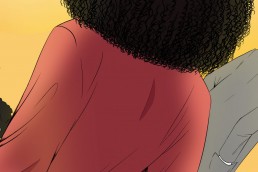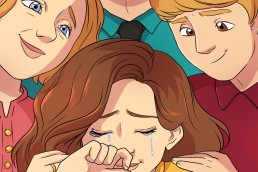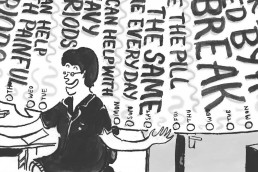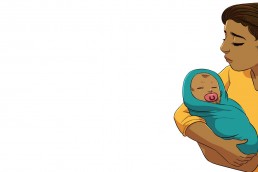by Anon
Photography: Eve Hepburn
In school, I was confident and slightly above average academically: perfect head girl material but never picked first in sports. When it came to making decisions about life after school, I was easily funnelled by the subtle expectations put upon me and last September, I started a Law degree miles away from my hometown.
Positive destination found: top marks education system ✓
End of story? I wish.
There is a cliché of university being a time where people find themselves – where reserved scholarly young people come out of their shells and take up binge drinking, people explore their sexuality and the rich kids learn to budget, rebelling against their upbringing etc etc…
The semester I became a Fresher wasn’t a blur of nights out, hungover lectures and wild student societies but a very real nightmare of sleepless nights, doctors’ appointments, and at some points an almost constant state of panic.
In the longest three months of my life, I just managed to keep my head above the surface and not drown like every part of my body was screaming for me to do. This required medication, CBT, counselling, ridiculously supportive flatmates, an extortionate phone bill used to cry to my parents and (then) boyfriend and as it turns out, Post-Traumatic Stress Disorder.
This wasn’t part of the plan.
As the term went on, my stress levels continued to rise as my sleep-deprived body desperately attempted to create enough adrenaline to get me through my end-of-semester exams. With a week to go until the Christmas Break, I had a fit and after an emergency hospital appointment with no clear diagnosis, was told by my GP that my body had gone into a spasm as a physical reaction to extreme stress. At this point, exhaustion was preventing logical thinking and – against the advice of the people around me – I sat (and passed) my end-of-term exams before officially withdrawing from my course a couple of weeks later.
There’s no universal guide to getting a degree, but I must have been in the bathroom when they mentioned that my experience could be a side effect.
I live in a very rural, close-knit community so when I first came home, I naturally dreaded answering the inevitable questions. I didn’t have an answer myself yet and was far too raw to explain how my mental and physical health had declined so dramatically.
I felt stupid and ashamed, like I had failed and let everyone down. My self-esteem was crushed. For months, I couldn’t talk about it without crying and would have to stop myself falling into panic, overwhelmed by memories of my lowest days.
It’s been over nine months since my last day and I’m still learning to accept what happened and the effect it has had on my mental health.
I now work at my local community radio station; actually getting paid to have fun. And one day, I hope to work as a counsellor. I also work with my old school’s social enterprise, helping young people get the most out their education and I’m assistant director at the local youth theatre; next year I’m hoping to run a marathon.
Most days I can see that I’m doing fine and have achieved some amazing things since university, but on other days I can’t see beyond my reliance on anti-depressants and regular counselling. Arguably, my search for a busy schedule could be a coping mechanism but I’ll find the balance.
It took me three months to accept that university wasn’t for me; some may take their whole time there to realise this, whilst others don’t have any issues at all. I won’t ever advise someone else not to go to university because of my experience, but I would suggest considering all the other paths available to you too.
I’m looking forward to a time when what happened doesn’t feel like such a big deal and I don’t feel as resentful of other people’s achievements, but right now I’m challenging my issues, focusing on being happy and I’d take that over a degree any day.







